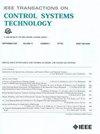Data-Driven LPV Control for Harmonic Disturbance Rejection in a Hybrid Isolation Platform
IF 3.9
2区 计算机科学
Q1 AUTOMATION & CONTROL SYSTEMS
引用次数: 0
Abstract
A novel approach for linear parameter-varying (LPV) controller synthesis for adaptive rejection of frequency-varying sinusoidal disturbances is proposed. Only the frequency response data of a linear time-invariant (LTI) multiple-input-multiple-output (MIMO) system are used to design the LPV controller that stabilizes the system for arbitrarily fast variation of the disturbance frequencies. Global stability is achieved thanks to the specific structure of the LPV controller and the use of integral quadratic constraints (IQCs) to represent the frequency variations. The LPV controller is designed by convex optimization in the frequency domain. A hybrid microvibration damping platform (MIVIDA) for space applications is considered for experimental validation of the proposed method. An LPV controller for rejection of unknown frequency-varying sinusoidal disturbances is designed and implemented on the real system. Experimental results demonstrate the effectiveness of the proposed approach in asymptotically rejecting disturbances and ensuring closed-loop stability against arbitrarily fast variations in disturbance frequencies.数据驱动LPV控制在混合隔离平台中抑制谐波干扰
提出了一种自适应抑制变频正弦干扰的线性变参数控制器合成方法。仅使用线性时不变(LTI)多输入多输出(MIMO)系统的频率响应数据来设计LPV控制器,该控制器可以在任意快速变化的干扰频率下稳定系统。由于LPV控制器的特殊结构和使用积分二次约束(iqc)来表示频率变化,因此可以实现全局稳定性。采用频域凸优化设计LPV控制器。考虑了用于空间应用的混合微振动阻尼平台(MIVIDA),对所提出的方法进行了实验验证。设计了一种抑制未知变频正弦干扰的LPV控制器,并在实际系统中实现。实验结果证明了该方法在渐近抑制干扰和保证闭环稳定性方面的有效性。
本文章由计算机程序翻译,如有差异,请以英文原文为准。
求助全文
约1分钟内获得全文
求助全文
来源期刊

IEEE Transactions on Control Systems Technology
工程技术-工程:电子与电气
CiteScore
10.70
自引率
2.10%
发文量
218
审稿时长
6.7 months
期刊介绍:
The IEEE Transactions on Control Systems Technology publishes high quality technical papers on technological advances in control engineering. The word technology is from the Greek technologia. The modern meaning is a scientific method to achieve a practical purpose. Control Systems Technology includes all aspects of control engineering needed to implement practical control systems, from analysis and design, through simulation and hardware. A primary purpose of the IEEE Transactions on Control Systems Technology is to have an archival publication which will bridge the gap between theory and practice. Papers are published in the IEEE Transactions on Control System Technology which disclose significant new knowledge, exploratory developments, or practical applications in all aspects of technology needed to implement control systems, from analysis and design through simulation, and hardware.
 求助内容:
求助内容: 应助结果提醒方式:
应助结果提醒方式:


